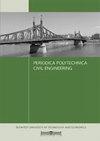盐处理废水对混凝土性能影响的实验研究
IF 1.4
4区 工程技术
Q3 ENGINEERING, CIVIL
引用次数: 1
摘要
世界人口的迅速增长以及为满足建筑和基础设施需要而伴随而来的混凝土生产的增加,导致了饮用水消费量的显著增加,从而造成了若干环境问题。为了使干旱地区的混凝土生产更加环保,本文研究了在混凝土搅拌中用高矿化处理过的废水代替饮用水的可行性。以盐水处理废水(salt - tww)为搅拌水制备混凝土试件,并与蒸馏水(DW)混合水进行对比,并与搅拌水质标准给出的性能要求进行比较。结果表明,与使用DW生产的对照混凝土相比,使用盐水tww生产的混凝土具有更高的早期强度和相似的长期强度。研究还发现,盐- tww的使用增加了水泥浆体的凝结次数,但对新拌混凝土的和易性没有显著影响。通过水渗透性试验、扫描电镜图像分析和x射线衍射试验对硬化混凝土的微观结构特征进行了评价。结果表明:与DW相比,盐水tww混凝土的微观结构更致密,孔隙尺寸更小,这表明盐水tww混凝土的耐久性有所提高。此外,还进行了电化学试验,以估计盐- tww和DW制备的增强砂浆试样中嵌入钢的腐蚀程度。电化学试验结果表明,采用100%盐水tww作为混凝土掺合水,预埋钢的腐蚀速率较高。本文章由计算机程序翻译,如有差异,请以英文原文为准。
Influence of Saline-treated Wastewater on Properties of Concrete: An Experimental Study
The rapidly growing world population and the accompanying increase in concrete production to meet building and infrastructure needs have led to significant increase in potable water consumption, which resulted in several environmental problems. This paper investigates the feasibility of replacing potable water with highly mineralized treated wastewater in concrete mixing in order to make concrete production more eco-friendly in an arid region. Concrete specimens were prepared using saline treated wastewater (saline-TWW) as mixing water and compared to those mixed with distilled water (DW) and with the performance requirements given by the mixing water quality standards. The results revealed that the concrete mixes produced using saline-TWW exhibited higher early strength and a similar long-term strength than the control mix produced using DW. It was also found that the use of saline-TWW increased the setting times of cement paste but had no remarkable effect on the workability of fresh concrete mixture. Furthermore, the microstructural characteristics of the hardened concrete were assessed by water-permeability test, SEM image analysis, and X-ray diffraction tests. The results revealed that saline-TWW concrete exhibited a more compact microstructure and smaller pore sizes than their counterparts of DW, which means an improvement in the durability of saline-TWW concrete. Moreover, an electrochemical test was conducted to estimate the extent of corrosion of the steel embedded in reinforced mortar specimens prepared using saline-TWW and DW. The electrochemical test results showed that the use of 100% saline-TWW as mixing water of concrete resulted in a high corrosion rate of the embedded steel.
求助全文
通过发布文献求助,成功后即可免费获取论文全文。
去求助
来源期刊

Periodica Polytechnica-Civil Engineering
工程技术-工程:土木
CiteScore
3.40
自引率
16.70%
发文量
89
审稿时长
12 months
期刊介绍:
Periodica Polytechnica Civil Engineering is a peer reviewed scientific journal published by the Faculty of Civil Engineering of the Budapest University of Technology and Economics. It was founded in 1957. Publication frequency: quarterly.
Periodica Polytechnica Civil Engineering publishes both research and application oriented papers, in the area of civil engineering.
The main scope of the journal is to publish original research articles in the wide field of civil engineering, including geodesy and surveying, construction materials and engineering geology, photogrammetry and geoinformatics, geotechnics, structural engineering, architectural engineering, structural mechanics, highway and railway engineering, hydraulic and water resources engineering, sanitary and environmental engineering, engineering optimisation and history of civil engineering. The journal is abstracted by several international databases, see the main page.
 求助内容:
求助内容: 应助结果提醒方式:
应助结果提醒方式:


